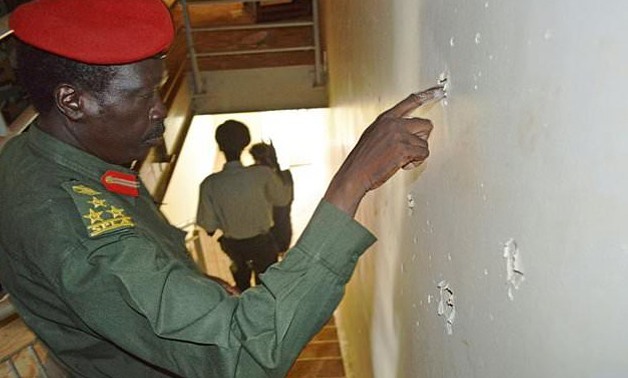
Brigadier General Knight Barino, President of the SPLA military court examines bullets holes in the wall of the Terrain Hotel, in Juba on July 3, 2017 - AFP
JUBA - 6 July 2017: Witnesses described looting and finding a dead body, but the trial of 12 soldiers accused of raping foreign aid workers in Juba proceeded Thursday in the absence of the victims.
The chilling attack on a hotel compound during fierce fighting in the South Sudanese capital a year ago cast a spotlight on atrocities by government troops in the country's three-year civil war.
And the military trial, now in its sixth week, has highlighted the difficulty in bringing perpetrators to book.
First there were 22 suspects, then 13, now 12 as the accused were dismissed one after another for lack of evidence. Witnesses have only identified three of them.
They are charged with looting and raping at least five foreign aid workers and murdering prominent journalist John Gatluak during the attack on the Terrain compound.
Some admit to the first charge, while others say they were not even present.
On Tuesday and Thursday, two Ugandan and two Kenyan witnesses who worked at the hotel described how soldiers entered the compound, asking if there were "rebels" inside, and proceeded to strip hotel rooms of money and mattresses.
One witness said they found a victim shot in the head -- which is how Gatluak was said to be murdered during the attack.
But they cannot prove it was him, and on Tuesday the court rejected Gatluak's death certificate as evidence, saying the doctor who signed it had not even seen the body.
As for the rape charge, on Thursday presiding Judge Brigadier General Knight Brunney said the "presence of the victims is a legal requirement" for the judgement of the case.
"The absence of the victims in the court will mean no case," defence lawyer Peter Malual Deng told AFP.
During a previous hearing the court evaluated email testimony and medical records from the foreign victims -- who have remained anonymous -- but deemed these insufficient.
Co-judge Colonel Deng Mayiel demanded to see medical reports from the victims.
"We need the names of those who were raped ... we want to clean the image of the army because we are taken wrongly and there are negative allegations against government," said Mayiel.
The atrocities at the Terrain were documented in reports by the United Nations and Human Rights Watch.
During the attack the aid workers made multiple appeals for help from nearby UN peacekeepers, which were turned down, a UN special investigation found.

Comments
Leave a Comment